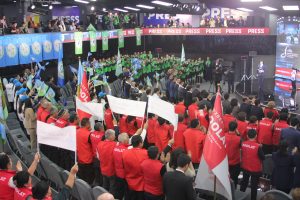On January 5, a second round of voting was held in 25 constituencies in Uzbekistan to close out the latest parliamentary election, which took place on December 22. After the final tallies, the balance of the new Uzbek Parliament was revealed. The new body closely resembles the old; though there are some changes worth noting, they may be cosmetic. Everything depends on what happens next.
In the final tally, Uzbekistan’s five political parties — none of which could be called “opposition” by any stretch of the imagination — accumulated similar numbers to the previous parliament.
The Liberal Democratic Party (O’zLiDeP), the presidential party, took 53 seats (it previously had had 52); the Democratic Party of Uzbekistan or Milliy Tiklanish gained the same 36 as in 2014; the People’s Democratic Party took 22 seats, down from 27; and the Social Democratic Party or Adolat took 24 seats, up from 20 in 2014. The Ecological Movement of Uzbekistan, which had been automatically allotted 15 seats in the 2014 parliament, won the same 15 seats in the election in its “new” form as a party.
Given the outcome, what we know is this: Uzbek citizens largely voted for whatever party they had previously cast ballots for.
We can interpret this in a variety of ways, but I’d argue that such tiny changes reflect, if anything, the continued lack of competition in the Uzbek political arena. It also may reflect apathy toward democratic politics in general. After all, there have been elections before and various parties on the ballots, but what has any of it mattered to the average Uzbek? There’s ample room for research on this topic, as knowing why individuals made the voting decisions they made will help us understand the political ecosystem better and help the Uzbek political system understand its constituents better.
The election cycle was more exciting than in the past, with televised debates livening the scenery and introducing some contentious issues to a public audience. But in conversations with admittedly random people on the streets of Tashkent, interest and expectations varied but trended toward skepticism. I came away from those conversations with a sense that average Uzbeks don’t quite know what the parliament does or how it affects them. Mentioning promised mosques for their vote or expressing anger about un-built stoplights belies a misunderstanding of parliament’s role and capabilities.
This is by no means unique to Uzbekistan (let’s not dwell on your average American’s understanding or faith in the U.S. legislature) — but is nevertheless a critical problem.
A positive change in the new parliament is an increase in the number of women, a doubling to 48 out of 150 seats. But whether this is a cosmetic change or a landmark moment will depend, as with judgment of whether this election is “real” progress or not, on what the parliament does next.
Will there be debate within the parliament like under the bright lights of the televised debate stage? Will the Uzbek parliament continue its tradition of voting unanimously on bills, many suggested by the president? Or will there be split votes, different perspectives on display, and — the dream — independent initiative from within the parliament?

































